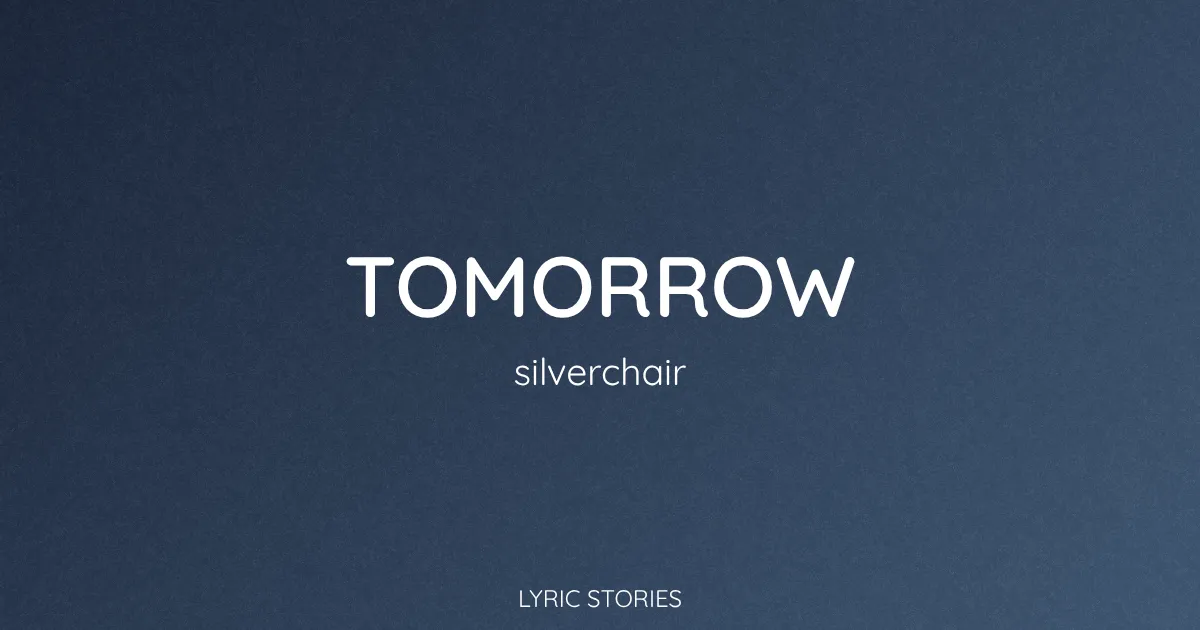Released in 1994 as the lead single from their debut album Frogstomp, “Tomorrow” by Silverchair became one of the band’s biggest hits. The song’s meaning centers on wealth, privilege, and the divide between the rich and the poor. Inspired by a TV program that lead singer Daniel Johns saw, the lyrics tell the story of a wealthy man struggling to adapt to an unfamiliar, less comfortable environment.
Below is a line-by-line interpretation of the lyrics in “Tomorrow.”
- Song: Tomorrow
- Artist: Silverchair
- Songwriters: Daniel Johns, Ben Gillies
- Released: 1994
- Album: Frogstomp
- Genre: Grunge
What is “Tomorrow” About?
Verse 1: A Stark Introduction
It’s twelve o’clock and it’s a wonderful day
I know you hate me, but I’ll ask anyway
The day is supposedly “wonderful,” but there’s immediate tension between the two people.
The phrase “I know you hate me” suggests a strained relationship, likely between someone wealthy and someone struggling.
Won’t you come with me to a place in a little town?
The only way to get there’s to go straight down
He invites someone to experience life in a different setting, perhaps a metaphor for poverty.
“Go straight down” could symbolize a descent into hardship or reality, implying that this isn’t a place someone can casually visit and leave unaffected.
There’s no bathroom and there is no sink
The water out of the tap is very hard to drink
The lack of basic necessities emphasizes the conditions of poverty.
The water being “hard to drink” could be literal, but it also symbolizes the difficulty of surviving in this environment.
It’s a contrast to the comfort that wealth provides.
Pre-Chorus: A Repeated Struggle
Very hard to drink
By repeating this line, the song reinforces the difficulty of enduring tough conditions.
It keeps the focus on the hardship that the wealthy character is experiencing, even if only temporarily.
Chorus 1: A Delayed Reality
You wait until tomorrow
This repeated single line is a warning.
It suggests that the privileged person will eventually have to face the reality of hardship, but for now, they continue to avoid it.
Verse 2: Money and Denial
You say that money isn’t everything
But I’d like to see you live without it
This challenges the common phrase that “money isn’t everything.”
The lyrics question whether those who say this truly understand what it’s like to live in poverty.
These lines expose the hypocrisy of dismissing money’s importance while still relying on it.
You think you can keep on goin’, livin’ like a king
Ooh, babe, but I strongly doubt it
This suggests that wealth creates a false sense of security.
The idea of “livin’ like a king” highlights privilege, while the statement “I strongly doubt it” predicts that this lifestyle isn’t sustainable forever.
Chorus 2: A Final Warning
You gonna wait too, fat boy
Fat boy, wait until tomorrow
This is the song’s most direct and confrontational moment.
“Fat boy” could be an insult aimed at someone who is privileged and well-fed while others struggle.
The phrase “wait until tomorrow” again suggests that reality will eventually catch up with them, even if they ignore it for now.
“Tomorrow” Song Meaning: A Clash Between Wealth and Struggle
“Tomorrow” highlights the divide between the rich and the poor. The song critiques the way privileged people dismiss financial struggles, assuming they could live without money while never actually experiencing hardship themselves.
The song shows someone wealthy being forced into a difficult situation and failing to cope. The repeated phrase “wait until tomorrow” serves as a warning that one day, circumstances could change and comfort could disappear.
Silverchair uses this song to call out entitlement and expose the harsh realities of life outside of privilege.
Songs Like “Tomorrow”
If you connect with the themes in “Tomorrow,” here are some other songs that explore similar ideas:
1. “Common People” by Pulp
“Common People” addresses the idea of wealthy individuals romanticizing poverty without experiencing its true hardships. This ties in perfectly with “Tomorrow,” as both songs call out the ignorance of privilege.
2. “Beverly Hills” by Weezer
“Beverly Hills” satirizes the desire for wealth and status, much like “Tomorrow” critiques entitlement. Both songs highlight the disconnect between perception and reality when it comes to privilege.
Related: Best Songs About Los Angeles
3. “Man in the Box” by Alice in Chains
“Man in the Box” takes on themes of control and oppression, much like “Tomorrow” discusses the barriers created by wealth and status. Both songs share a raw, aggressive energy in their messages.
Related: “Man in the Box” Song Meaning
4. “Rich and Miserable” by Kenny Chesney
“Rich and Miserable” is a country song that questions whether money truly brings happiness, echoing the message in “Tomorrow” about the illusion of wealth. Both songs challenge the idea that financial success guarantees fulfillment.
Conclusion: The Reality Behind Privilege
“Tomorrow” is a direct critique of entitlement and the way wealth shields people from struggle. It shows how privilege creates a false sense of security, while those without money deal with harsh realities every day.
The song serves as a warning that no one can escape reality forever. At some point, comfort may disappear, and those who once ignored others’ struggles will have to face them.
Be sure to check out more 1990s Song Meanings!

